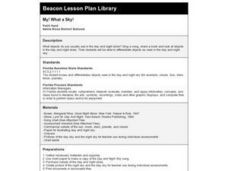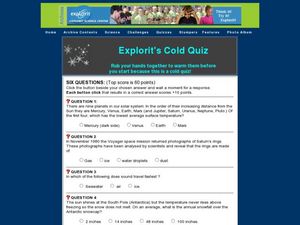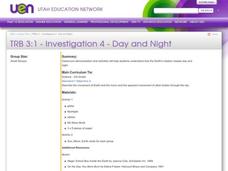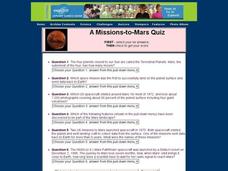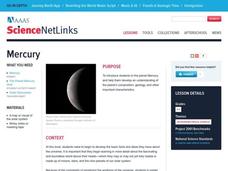Curated OER
The Starry Night Time and Day Time
Second graders complete a unit of lessons on the solar system. They complete various art projects inspired by Van Gogh's 'Starry Night,' create a moon phases book, create a moon phase wind chime, develop a timeline of space exploration,...
Curated OER
Watch This Space!
In this space worksheet, students, with a partner, answer five questions about the universe and read and discuss ten questions regarding astronomy.
Curated OER
My! What a Sky!
First graders read "Goodnight Moon" or "Day And Night" and discuss what they see in day and night skies. They read and sing lyrics to the "Day and Night" song. They identify objects in the sky as day or night objects. They illustrate day...
Curated OER
Sensing the Invisible
Students study visible light and explain why we want to use infrared radiation to study Mercury. In this sunlight instructional activity students construct a device to measure the presence of infrared radiation in sunlight.
Curated OER
Explorit's Cold Quiz
In this cold quiz worksheet, students complete a six question multiple choice on-line interactive quiz about cold places and cold weather.
Curated OER
My Shadow is following me
In this outer space worksheet, students read "My Shadow is following me" and learn about the Solar System and how shadows are created. They then complete the 2 students tasks and answer the 5 questions in the packet. The answers are on...
Curated OER
Day and Night
Third graders view a classroom simulation that demonstrates how the Earth's rotation creates day and night.
Curated OER
A Mission-To-Mars Quiz
In this space exploration worksheet, students complete a 6 question multiple choice on-line interactive exercise about the exploration of Mars.
Curated OER
Windows to the Universe Scavenger Hunt
Students access the Internet to go on a scavenger hunt to investigate the solar system. In this space mission lessons students fill out a worksheet and explain how technology and scientific inquiry have helped us learn about the...
Curated OER
Mercury
Students study the planet Mercury and develop an understanding of the planet's composition, geology, and other important characteristics. They explore a Web resource on the planet Mercury which is the central focus of this lesson.
Curated OER
Meteorites
Students model how meteors fall to the surface of planets. In this space science lesson, students identify different types of meteorites using an interactive online website. They investigate the relationship between a meteorite's size...
Curated OER
Solar System
In this online interactive Solar System worksheet, students access a specific website to locate the multiple choice answers to 4 questions dealing with the Solar System. Students answer 3 short answer questions and draw a line connecting...
Curated OER
Our Solar System to Scale
Middle schoolers calculate the diameter of planets and their relative distances. In this space science lesson, students discover how small or big the planets are in comparison to each other. Middle schoolers use cross multiplying...
Curated OER
Planet Earth
In this Earth worksheet, students review the characteristics of the Earth including it's rotation and revolution. This worksheet has 9 fill in the blank and 7 short answer questions.
Curated OER
The Earth, Sun Mood and Stars Unit (Planets too!)
Fifth graders prepare five activities to do then show their energy saving skills. In this investigative lesson students create five projects then participate in an energy saving demonstration.
Curated OER
Does the Distance Between the Earth and Sun Cause the seasons?
Learners reflect upon the concepts of seasons. The concepts are taught using a variety of different teaching approaches. A activities lead to a reflection that will help students to make a cognitive transfer of information form...
Curated OER
Parts of the Universe
In this universe worksheet, students will complete a graphic organizer by writing in the different parts of the universe, including a brief description of each of these parts.
Curated OER
Cosmic Survey
In this cosmic survey instructional activity, students rank the given cosmic items by size, distance from Earth, and age and complete 3 graphic organizers. Then students complete 5 short answer questions.
American Museum of Natural History
Solar System Scavenger Hunt
Scholars go on a hunt to locate objects that best fit the measurements to create an eye-catching scale model of the solar system.
Voyage Solar System
Round and Round We Go — Exploring Orbits in the Solar System
Math and science come together in this cross-curricular astronomy lesson plan on planetary motion. Starting off with a hands-on activity that engages the class in exploring the geometry of circles and ellipses, this lesson plan then...
American Museum of Natural History
What is Astronomy?
Go study the universe. Pupils learn seven aspects about astronomy and astronomers. They begin to learn about constellations; distance and motion between objects; gravity; the electromagnetic spectrum; dark matter and energy; and teams of...
American Museum of Natural History
Journey to the Stars
Fifteen detailed pictures and informative captions delve deep into the exploration of stars—their life cycle and importance in the universe.
Laboratory for Atmospheric and Space Physics
Looking to the Future
New Horizons set forth on a mission to Pluto in 2006. Ten years later, the spacecraft is still on its way. Here, enthusiastic scholars predict what they will be like—likes, dislikes, hobbies, etc.—when New Horizons arrives at its...
American Museum of Natural History
Make a Terrarium
Scholars read a brief overview of what a terrarium is and how it creates the greenhouse effect, then click on a link to discover the materials and 10 steps they need to build their own.
Other popular searches
- Sun and Planets Wordsearch
- Sun and Planets Word Search
- The Sun and Its Planets
- Sun and Planets Pictures
- Planets Distance From Sun
- Why Do Planets Orbit the Sun




